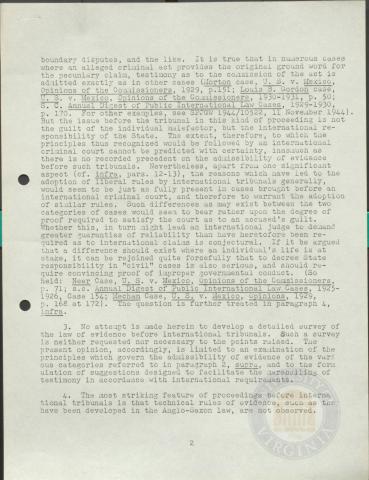
Page 2
| Parent | Perpetuation of testimony by Witnesses in U. S. for Presentation to International Military Tribunal |
|---|---|
| Date | 18 June 1945 |
| Language | English |
| Collection | Tavenner Papers & IMTFE Official Records |
| Box | Box 1 |
| Folder | General Reports and Memoranda from January 1946 |
| Repository | University of Virginia Law Library |
boundary disputes, and the like. It is true that in numerous cases where an alleged criminal act provides the original ground word for the pecuniary claim, testimony as to the commission of the act is admitted exactly as in other cases (Morton case, U. S. v. Mexico, Opinions of the Commissioners, 1929, p.151; Louis B. Gordon case, U. S, v. Mexico, Opinions of the Commissioners, 1930-1931, p. 50; S. C. Annual Digest of Public International Law Cases, 1929-1930, p. 170. For other examples, see SPJGW 1944/10522, 11 November 1944). But the issue before the tribunal in this kind of proceeding is not the guilt of the individual malefactor, but the international re¬sponsibility of the State. The extent, therefore, to which the principles thus recognized would be followed by an international criminal court cannot be predicted with certainty, inasmuch as there is no recorded precedent on the admissibility of evidence before such tribunals. Nevertheless, apart from one significant aspect (cf. infra, pars. 12-13), the reasons which have led to the adoption of liberal rules by international tribunals generally, would seem to be just as fully present in cases brought before an international criminal court, and therefore to warrant the adoption of similar rules. Such differences as may exist between the two categories of cases would seem to bear rather upon the degree of proof required to satisfy the court as to an accused's guilt. Whether this, in turn might lead an international judge to demand greater guaranties of reliability than have heretofore been re¬quired as to international claims is conjectural. If it be argued that a difference should exist where an individual's life is at stake, it can be rejoined quite forcefully that to decree State responsibility in "civil" cases is also serious, and should re¬quire convincing proof of improper governmental conduct. (So held: Neer Case, U. S. v. Mexico, Opinions of the Commissioners, p. 71; s.c. Annual Digest of Public International Law Cases, 1925- 1926, Case 154; Mecham Case, U. S. v. Mexico, Opinions, 1929, p. 108 at 172). The question is further treated in paragraph 4, infra.
3.No attempt is made herein to develop a detailed survey of the law of evidence before international tribunals. Such a survey is neither requested nor necessary to the points raised. The present opinion, accordingly, is limited to an examination of the principles which govern the admissibility of evidence of the various categories referred to in paragraph 2, supra, and to the formulation of suggestions designed to facilitate the marshalling of testimony in accordance with international requirements.
4.The most striking feature of proceedings before international tribunals is that technical rules of evidence, such as the have been developed in the Anglo-Saxon law, are not observed.
